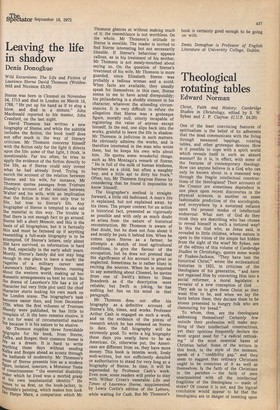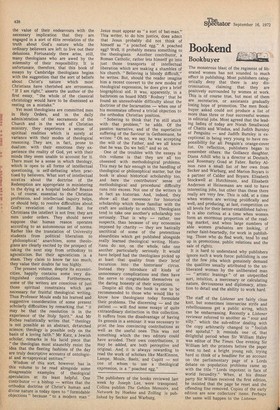Theological rotating tables
Edward Norman
Christ, Faith and History: Cain bridge Studies in Christology, edited by S. W. Sykes and J. P. Clayton (C.U.P. £4.20) One of the least convincing features of spiritualism is the belief of its adherents that the dead communicate with the living through measured tappings, rotating tables, and other grotesque devices. How is it possible to cope with a spirit world which reveals itself in such an absurd manner? So it is, in effect, with some of the features of contemporary theology. How can anyone believe in a God who can only be known about in a reasoned way through the fragile intellectual constructions of the theologians? Their accounts of the Creator are sometimes dependent in one place upon recent discoveries in the physical sciences, in another on some fashionable prediction of the sociologists, and everywhere by a sustained reliance upon the present modes of intellectual endeavour. What sort of God do they think they are describing who has chosen to reveal himself in such a tortured way? Is this the God who, as Jesus said, is revealed to little children, whose nature is open to the vision of the simple but hidden from the sight of the wise? Mr Sykes, one of the editors of this volume of Cambridge Studies in Christology, quotes some words of Foakes-Jackson. "They have lost the historical Christ," wrote the ecclesiastical historian in 1921, in criticism of the theologians of his generation, "and have not regained Him by converting Him into a social reformer, a moral legislator, a revealer of a new conception of God ... They ask us to give them Christ as they want Him to be, and when we lay the facts before them, they declare them to be stones presented to hungry folk who are clamouring for bread."
To whom, then, are the theologians addressing themselves? Certainly few outside their profession will make anything of their intellectual constructions, yet their opinions frequently declare the most urgent need for "a radical rethinking" of the most essential bases of Christian belief. Some of the writers in this book, in the style of the moment, speak of a "credibility gap," and they seem to suggest that ordinary Christians ought to be conscious of it as well as themselves. Is the faith of the Christians in the parishes — the faith of men unacquainted with all the intellectual fragilities of the theologians — made of straw? Of course it is not, and the logical conclusion would appear to be that the theologians are in danger of insisting upon the value of their endeavours with the necessary implication that they are engaged in a sort of elite revelation of the truth about God's nature while the ordinary believers are left to live out their delusions. Fortunately there arise, still, many theologians who are awed by the solemnity of their resposibility. It is unfortunate, therefore, that this book of essays by Cambridge theologians begins with the suggestion that the sort of beliefs about Christ's nature which most Christians have cherished are erroneous. "If I am right," asserts the author of the first essay, "the whole of the classical christology would have to be dismissed as resting on a mistake."
Yet most theologians are committed men in Holy Orders, and in the daily administration of the sacraments of the Church and in the work of Christian ministry, they experience a sense of spiritual realities which is surely at variance with their modes of theological reasoning. They are, in fact, prone to dualism: with their emotions they experience the reality of God, yet with their minds they seem unable to account for it. There must be a sense in which theology, which is open to all forms of intellectual questioning, is self-defeating when practised by believers. What sort of intellectual niceties about the doctrine of the Redemption are appropriate in ministering to the dying at a hospital bedside? Reason is, of course, essential to the Christian profession, and intellectual inquiry helps, or should help, to resolve difficulties about God's revelation of himself. But for Christians the intellect is not free; they are men under orders. They should never suppose that human reason operates according to an autonomous set of norms. Rather like the translation of University students from political liberalism to ' philosophical ' anarchism, some theologians are clearly excited by the prospect of taking the next step from orthodoxy to agnosticism. But their agnosticism is a sham. They claim to know far too much; they value their doubts far too highly.
The present volume, despite its eccentricities, happily contains some very distinguished contributions. Furthermore, some of the writers are conscious of just those spiritual constraints which are necessary for fruitful theological writing. Thus Professor Moule ends his learned and suggestive consideration of some present scholarly difficulties by remarking that " it may be that the resolution is in the experience of the Holy Spirit." And Mr Riches realistically writes that " theology is not possible as an abstract, det atched science; theology is possible only on the basis of a loving faith." Mr Katz, a Jewish scholar, remarks in his lucid piece that "the theologian must staunchly resist the idea that the fleeting fashions of the day are truly descriptive accounts of ontological and m Itapnysical entities."
Wisdom of this sort, however, has in this volume to be read alongside some disagreeable examples of theological speculation at its least helpful. One contributor — a bishop — writes that the orthodox doctrine of Christ's human and divine nature is today open to "formidable objections" because "to a modern man" Jesus must appear as "a sort of bat-man." This writer, to do him justice, does admit that Jesus probably did not think of himself as "a poached egg." A poached egg? Well, it probably means something to the theologians. Another contributor, a Roman Catholic, rather lets himself go into just those transports of intellectual liberation which are making a shambles of his church. " Believing is bloody difficult," he writes. But, should the reader imagine him a recent convert to the new modes of theological expression, he does give a brief biographical aid. It was, apparently, in a bathroom on board HMS ' Rodney ' that he found an unresolvable difficulty about the doctrine of the Incarnation — when one of his messmates offered a trivial objection to the orthodox Christian position.
"Sobering to think that I'm still stuck with that problem," he adds. Of the passion narrative, and of the superlative suffering of the Saviour in Gethsemane, he writes: "Oh no, we say, he was accepting the will of the Father, and we all know that he was. Do we hell." and so on.
One of the troubles with the essays in this volume is that they are all too obsessed with methodological problems. This may be fair enough in the handling of theological or philosophical matter, but the book is about historical scholarship too, and here the contributors' sense of methodological and procedural difficulty runs into excess. Not one of the writers is in fact an historian. And, indeed, they show all that reverence for historical scholarship which those familiar with the craft are unlikely to exhibit. Theologians tend, to take one another's scholarship too seriously. That is why — rather, one suspects, than because of any economies imposed by charity — they are basically uncritical of some of the pretentious absurdities which get published alongside really learned theological writing. Historians do not, on the whole, take one another particularly seriously. It would have helped had the theologians picked up at least that quality from their brief excursion into the historians' circus. Instead they introduce all kinds of unnecessary complications and then have the nerve to congratulate themselves on the daring honesty of their scepticism. , Despite all this, the book is one to be recommended to those who would like to know how theologians today formulate their problems. The discerning — and the patient — will find some essays of quite extraordinary distinction in this collection. It suffers from the disadvantage of having its genesis in a seminar: it was necessary to print the less convincing contributions as well as the useful ones. This was not something which the two editors could have avoided. Their own contributions, it may be added, are both perceptive and original. And it is always rewarding to read the work of scholars like MacKinnon, Lampe, Moule, Baelz," and Cupitt — not one of whom to use a theological expression, is a "poached egg."
The publishers of the books reviewed last week by Joseph Lee, were transposed. Collins publish The Gehlen Memoirs, and Network by Hoehne and Zolling is published by Secker and Warburg.



































 Previous page
Previous page